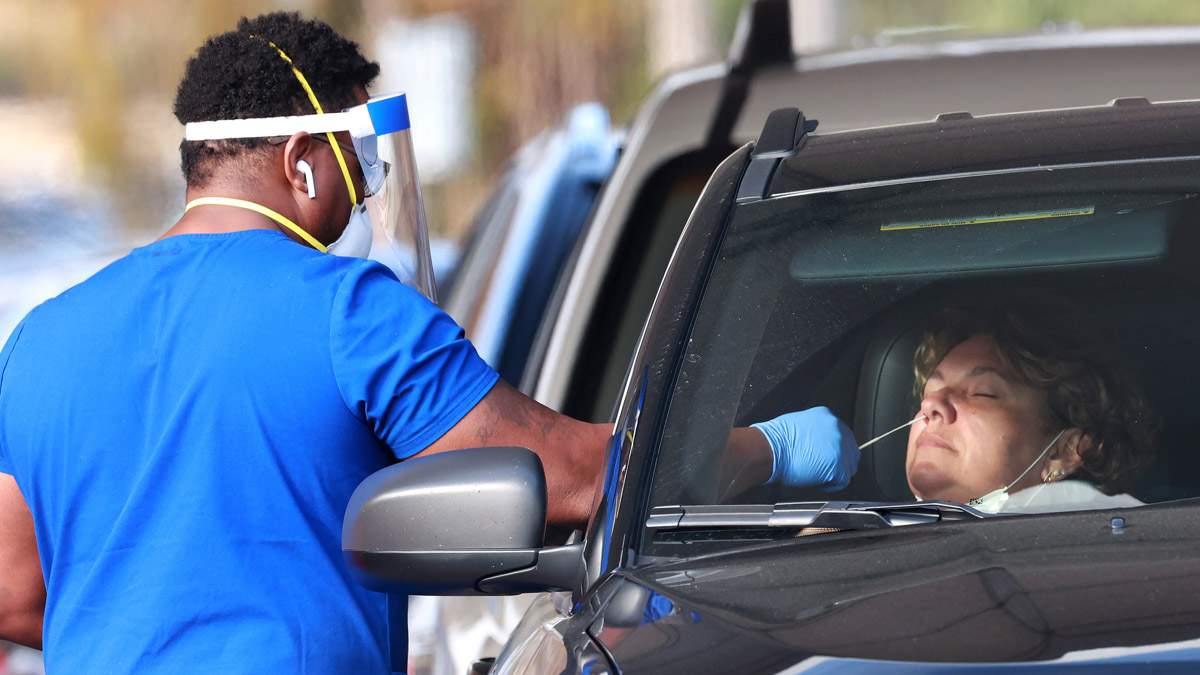Hospitalizations and new cases of COVID-19 are continuing to rise both locally and across the state, data from health departments show.
On July 15, the Texas Department of State Health Services (DSHS) added more than 4,700 confirmed and probable cases of COVID-19 statewide bringing the total since March 2020 to more than 3 million.
There is a concern that with the increased ability of the Alpha and Delta variants to spread more easily that the number of new cases may continue to grow. That is supported by recent trends showing upward movement in the positivity index and in hospitalizations both locally and statewide.
Get top local stories in DFW delivered to you every morning. Sign up for NBC DFW's News Headlines newsletter.
The positivity index measures the percentage of people who have been tested for the virus that was confirmed to have been infected. As of July 15, the most recent date for which there is state data, the molecular positivity index had climbed back to 8.83% from a low of 2.81% reached on June 16. The antigen positivity rate is also up, to 6.4% from a low of 2.05% on June 6.
Hospitalizations, meanwhile, have grown from a statewide low of 1,428 on June 27 to 2,519 through July 15.
In TSA-E, of which Dallas-Fort Worth is a large part, hospitalizations dropped to 289 on June 5 but have been rising steadily since. As of Wednesday, there were 680 people hospitalized in TSA-E with COVID-19. In the last week, that number has grown by nearly 200 patients according to state data.
Stephen Love, CEO, and president of the DFW Hospital Council, said the number of patients grew to 700 on Thursday.
"What you need to know is that is a 70% increase in the last two weeks," Love said.
Love acknowledged the number of hospitalized North Texans isn't near the 4,250 seen in January, but said a number of factors including people being more mobile now than in the winter, many going without masks, the increased transmissibility of variants and roughly 50% of the state still unvaccinated there remains a cause for concern for further increases in the spread of the virus.
If current trends don't change, forecasters at UT Southwestern said the number of hospitalizations in the region this fall could surpass those seen last summer.
In Tarrant County, the public health department raised the community spread level from moderate to substantial due to increases in the positivity rating (which is now over 10% in Tarrant County for consecutive days) and increases in the cases per 100,000 people.
“The Tarrant County COVID-19 positivity rate has steadily grown for several weeks,” said Tarrant County Public Health Director Vinny Taneja on Thursday. “We are now at 12%, which is a significant increase from around 2% a month ago."
The county reported 966 cases of COVID-19 on Saturday, the highest new case total since February 11, when 1,034 new cases were reported. The daily totals reported by the county represent data from tests done in approximately the last 10 days.
Tarrant County Health Department spokesman Brian Murnahan said the spike that could be attributed in part to the Delta variant, as well as Fourth of July gatherings.
He also noted that of the 17,533 cases of the coronavirus reported from March to June, 98.9% were in unvaccinated people.
In Dallas County, the positivity index was 5.3% on Thursday. The county is showing, however, a similar increase in hospitalizations seen elsewhere. After seeing declines in May and June in ER visits and admissions, both are again trending upward in mid-July.
Dallas County health officials reported Wednesday that roughly 86% of COVID-19 cases diagnosed in the week ending June 26 were among residents who were not fully vaccinated.
"That’s where this is showing this is preventable now. We have the vaccine so readily available. You can get them at your corner drug store or grocery store," Dallas County Health and Human Services director Dr. Philip Huang said Thursday.
While officials in nearby Austin have increased COVID precaution guidelines, Dallas County Judge Clay Jenkins said he'll continue to follow the guidance of the CDC which says those who are vaccinated don't need to wear masks.
The agency still suggests those who aren't vaccinated wear one in public places.
"The virus is evolving and so the way that we fight it has to evolve also. Right now, the data that we’re looking at is not great," said Jenkins. “Still, the answer is the same as it was two months ago, get vaccinated.”
It's a call to action echoed by Taneja, Love and other health officials.
"The best way to curb the spread of the virus is to get vaccinated with one of the COVID-19 vaccines," Taneja said.
"I know that you don’t want to be preached to, and I know you have a right to make up your own mind, but please look at the facts and don’t get your facts off social media. Look at scientific facts. Make an informed decision and please get your vaccination," Love said. "This Delta variant is much more contagious than the original variant and now we’re even hearing out of Houston they’re calling it Delta-plus. It’s really another mutation of the Delta variant that’s got an additional protein, so now is the time to get vaccinated."
For more information on COVID-19 or an update on cases in your area, visit our COVID-19 tracker which visualizes case data from local and state health departments.
COVID-19 Latest
NBC 5's Lili Zheng, Allie Spillyards, Lizbeth Lincon and Brandi Smith contributed to this report.


